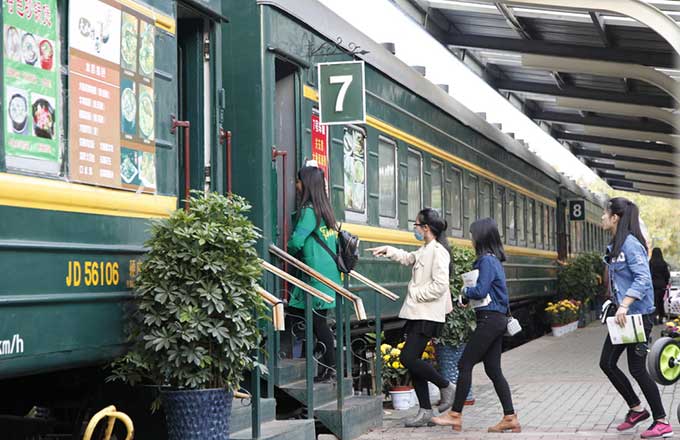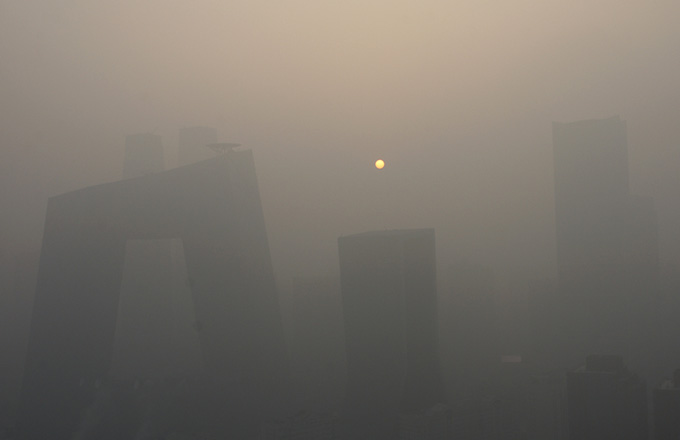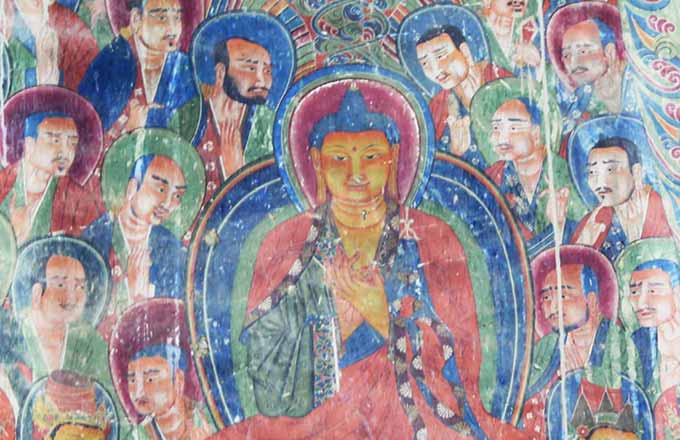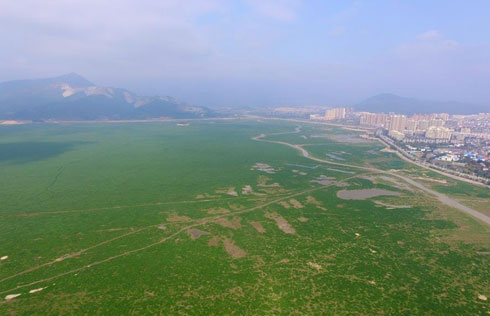Families suffer amid Tibetan flames of deceit




Loss of life
Gannan Tibetan autonomous prefecture boasts 121 Tibetan Buddhist monasteries, the most renowned being Labrang Monastery, one of the six great temples of the Geluk school of Tibetan Buddhism. The Hezuo Monastery, a Geluk monastery founded in 1673, has 147 monks.
On the morning of Jan 12 (Dec 1 in the Chinese lunar calendar) a phalanx of more than 40 monks from Hezuo Monastery were rehearsing a religious dance for a grand Buddhist ceremony scheduled for the 14th day of the lunar January (Feb 23.) Their chanting broke the morning silence.
It was a Saturday. Children in the neighborhood came in twos and threes to play in the monastery. At the sight of the sutra hall, they went in and knelt down to worship.
Believers - Tibetans and Han people alike - circled the white tower erected near the monastery, chanting prayers. Their bicycles and scooters were parked nearby.
There were no traces of the fire that cost a Tibetan woman her life about six months earlier.
On Aug 7, 2012, Trakhutso, 26, enveloped in flames, rolled on the hillside northwest of the white tower, murmuring, "Let me die. Let me die."
The fire was put out by another Tibetan woman, who had been circling the tower.
Soon after, a monk from Hezuo Monastery named Chophel arrived at the site. He took pictures of Trakhutso and with the help of some other monks, carried her to the office of the monastery's management committee.
He neither called the police nor sent the injured, but still living, woman to the hospital, thus delaying Trakhutso's treatment.
According to Chophel's police confession, he used his mobile phone to transmit four pictures of the self-immolator, her name and those of her parents and "her statements about the return of the Dalai Lama and the freedom of Tibetans" to people abroad.
The four pictures were exactly what some foreign media used in their reports of the incident.
Chophel has since been arrested on suspicion of intentional homicide.
Police found that Trakhutso, who had a problem with her left leg, had sour relations with her husband and his family. More often than not, she was subjected to blame and bullying from her mother-in-law.
During Spring Festival in 2012, Trakhutso's sister-in-law praised self-immolators in a conversation, saying, "How awesome! What they did was for the return of the Dalai Lama and the undertaking of the Tibetans!"
Four days before Trakhutso ignited herself, she had a physical examination, in which she was diagnosed with a common gynecological disease. It was then that the idea of giving up her life took hold.
Trakhutso went back to her parents' home on Aug 6. She heard her father say, "Self-immolators, even if they die, are so lucky to have the Dalai Lama to atone for their sins with scripture chanting."
Trakhutso got carried away by these statements.
"The belief that people who burn themselves to death will have their souls released from purgatory and attain bliss in the afterlife is never part of the Buddhist creed," explained 62-year-old Sodzamtsang Rinpoche from Hezuo Monastery.
"Self-immolation is not a heroic act, but a stupid one that misinterprets Buddhist doctrine."
But Sangye Gyatso, a 26-year-old resident of Duohe village, Nawu township in the city of Hezuo, the seat of the prefectural government of Gannan, saw it differently.
After Trakhutso died, Sangye Gyatso told his friends over drinks, "[The city of] Hezuo has risen to fame because of a woman. For Duohuo [village], it will be because of me."
According to his confession to police, he and several friends used their cell phones to spread pictures of a burning Trakhutso. He was also a regular viewer of the VOA's Tibetan-language programming.
Police have confirmed that Sangye Gyatso installed a satellite receiver in his house and used to watch VOA Tibetan-language programs every Monday, Wednesday and Friday. Broadcasts about "Tibetan independence" and self-immolations had a great impact on him and his friends.
On Oct 6, 2012, Sangye Gyatso died in the fire he lit himself.
Police investigations show that Sangye Gyatso was handled in accordance with the law in 2007 for repeated acts of theft, which were carried out with the help of others. He had been without a job for a long time.
Khyi Gyatso, 33, a village friend of Sangye Gyatso's, had been a monk at the local Duohe Monastery before leaving China through illegal means to become a monk in an Indian monastery in 2000.
As a key member of the "Tibetan Youth Congress," Khyi Gyatso introduced Sangye Gyatso to ideas about "Tibetan independence" during his stay in China in 2011.
After returning to India in September 2011, Khyi Gyatso continued to contact Sangye Gyatso by phone and e-mail, urging him "contribute to the cause of Tibetans and improve his status and that of his family" by following the pattern of the "heroic deed" of self-immolation.
In January 2012, Khyi Gyatso and Gonpo Konchoghu, another member of the "Tibetan Youth Congress" as well as a former monk at Duohe Monastery, held a meeting in India with around 30 monks from Gansu's Gannan Tibetan autonomous prefecture, who were in India at the time for a so-called "religious session" held by the Dalai Lama clique. The monks included 41-year-old Kalzang Gyatso and 32-year-old Gonpo Je.
The meeting was about planning the self-immolations of Tibetans in China.
In April 2012, Gonpo Konchoghu illegally entered China and urged Sangye Gyatso to self-immolate, promising to send his picture overseas afterwards and to request that the Dalai Lama arrange a religious session for him in India.
On Oct 6, 2012, Sangye Gyatso phoned three people, including Gonpo Je, about the time and place of his self-immolation.
After Sangye Gyatso set himself on fire, Tashi Gyatso and Gonpo Je, among others who were all there waiting, took photos of the self-immolation process and quickly sent them overseas.
That afternoon, Khyi Gyatso, who was then overseas, released the "news" about the self-immolation. Shortly afterward, the Dalai Lama clique launched a high-profile "propaganda" campaign on the well-orchestrated incident, claiming there was a "humanitarian crisis" in China and calling for the international community to interfere.
Gansu police have apprehended seven principal suspects, including Kalzang Gyatso, Gonpo Je and Tashi Gyatso.
Chinese police have also requested that police in relevant countries help investigate Gonpo Konchoghu via channels for international police cooperation.
But these efforts have failed to stop the flames of self-immolations from spreading further and claiming more lives.
On Oct 23, 2012, Togye Rinchen, a 58-year-old Tibetan villager, set himself on fire near a shopping center in Gannan's Xiahe county. Those who incited the self-immolation also provided pictures to the VOA.
On Jan 31, six ethnic Tibetans were sentenced to three to 12 years in prison for their roles in Togye Rinchen's self-immolation by the Xiahe County People's Court.
Located more than 70 km from the city of Hezuo, the prefectural capital, Xiahe is considered the prefecture's religious center.
After spotting the incident, police officers put out the fire, with Togye Rinchen still showing signs of life.
As police officers worked to rescue the self-immolator, some monks and people in the crowd attempted to carry him into the monastery. They attacked and injured the officers, hampering their rescue efforts.
"When I saw the self-immolator's left hand still moving, I grabbed an extinguisher and soaked quilt and tried to save him," Liu Yaguo, a police officer from the county's public security bureau, recalls. "But a crowd was already gathering. A woman tried to stop me by lashing me with a belt and a tall man beckoned more people over."
- 6 Tibetans jailed over self-immolation case
- China sentences 2 Tibetans over self-immolation
- 2 Tibetans stand trial over self-immolation
- Detained man 'incited another to self-immolate'
- NW China police arrest self-immolation inciter
- Buddhist doctrine opposes self-immolation
- Spark for self-immolation unwilling to do the same
- Two Tibetans tried over self-immolations
- Top legislature reviews draft interpretation to Hong Kong SAR Basic Law
- Giant panda twins fly to China from Zoo Atlanta
- China maintains orange alert for smog
- Judicial transparency report shows verdict openness needs improvement
- College students in E China enjoy meals in train-turned-canteen













